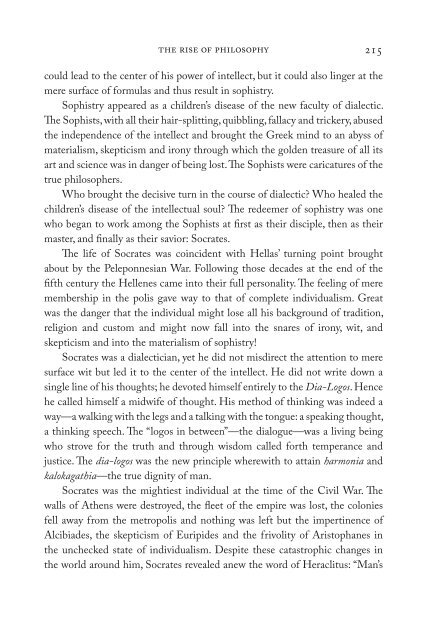The Gospel of Hellas - Research Institute for Waldorf Education
The Gospel of Hellas - Research Institute for Waldorf Education
The Gospel of Hellas - Research Institute for Waldorf Education
You also want an ePaper? Increase the reach of your titles
YUMPU automatically turns print PDFs into web optimized ePapers that Google loves.
the rise <strong>of</strong> philosophy<br />
could lead to the center <strong>of</strong> his power <strong>of</strong> intellect, but it could also linger at the<br />
mere surface <strong>of</strong> <strong>for</strong>mulas and thus result in sophistry.<br />
Sophistry appeared as a children’s disease <strong>of</strong> the new faculty <strong>of</strong> dialectic.<br />
<strong>The</strong> Sophists, with all their hair-splitting, quibbling, fallacy and trickery, abused<br />
the independence <strong>of</strong> the intellect and brought the Greek mind to an abyss <strong>of</strong><br />
materialism, skepticism and irony through which the golden treasure <strong>of</strong> all its<br />
art and science was in danger <strong>of</strong> being lost. <strong>The</strong> Sophists were caricatures <strong>of</strong> the<br />
true philosophers.<br />
Who brought the decisive turn in the course <strong>of</strong> dialectic? Who healed the<br />
children’s disease <strong>of</strong> the intellectual soul? <strong>The</strong> redeemer <strong>of</strong> sophistry was one<br />
who began to work among the Sophists at first as their disciple, then as their<br />
master, and finally as their savior: Socrates.<br />
<strong>The</strong> life <strong>of</strong> Socrates was coincident with <strong>Hellas</strong>’ turning point brought<br />
about by the Peleponnesian War. Following those decades at the end <strong>of</strong> the<br />
fifth century the Hellenes came into their full personality. <strong>The</strong> feeling <strong>of</strong> mere<br />
membership in the polis gave way to that <strong>of</strong> complete individualism. Great<br />
was the danger that the individual might lose all his background <strong>of</strong> tradition,<br />
religion and custom and might now fall into the snares <strong>of</strong> irony, wit, and<br />
skepticism and into the materialism <strong>of</strong> sophistry!<br />
Socrates was a dialectician, yet he did not misdirect the attention to mere<br />
surface wit but led it to the center <strong>of</strong> the intellect. He did not write down a<br />
single line <strong>of</strong> his thoughts; he devoted himself entirely to the Dia-Logos. Hence<br />
he called himself a midwife <strong>of</strong> thought. His method <strong>of</strong> thinking was indeed a<br />
way—a walking with the legs and a talking with the tongue: a speaking thought,<br />
a thinking speech. <strong>The</strong> “logos in between”—the dialogue—was a living being<br />
who strove <strong>for</strong> the truth and through wisdom called <strong>for</strong>th temperance and<br />
justice. <strong>The</strong> dia-logos was the new principle wherewith to attain harmonia and<br />
kalokagathia—the true dignity <strong>of</strong> man.<br />
Socrates was the mightiest individual at the time <strong>of</strong> the Civil War. <strong>The</strong><br />
walls <strong>of</strong> Athens were destroyed, the fleet <strong>of</strong> the empire was lost, the colonies<br />
fell away from the metropolis and nothing was left but the impertinence <strong>of</strong><br />
Alcibiades, the skepticism <strong>of</strong> Euripides and the frivolity <strong>of</strong> Aristophanes in<br />
the unchecked state <strong>of</strong> individualism. Despite these catastrophic changes in<br />
the world around him, Socrates revealed anew the word <strong>of</strong> Heraclitus: “Man’s

















